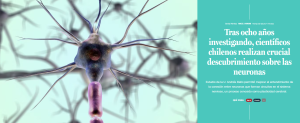La Tercera| After Eight years of Research, Chilean Scientists make a Crucial Discovery about Neurons
Francisca Bronfman, an academic researcher at the UNAB Institute of Biomedical Sciences, led the study whose results could open the door to controlling the expression of altered genes in neurodegenerative diseases, opening alternative routes for gene therapy.
By Felipe Salazar
Of the 25 years Dr. Francisca Bronfman has devoted to the study of neurons, eight were devoted to this study, which made significant findings on how neurons form circuits in the nervous system.
With the collaboration of different universities in Chile, the United States, and Israel, the UNAB Institute of Biomedical Sciences academic and her team achieved a space in the prestigious scientific journal eLife.
The results of this work are framed within the framework of brain or neuronal plasticity, which refers to the cellular and molecular processes that allow the connection between neurons that form circuits in the nervous system, «such would be the basis of different physiological processes that allow us, for example, to store or learn new skills,» explains Bronfman.
Research Findings
The work of Bronfman and her team shows that BDNF, a neurotrophin (neuronal protein) essential for neuronal plasticity processes, can initiate a signal in the axon. This signal is transported to the nucleus, activating gene expression that favors the connection between neurons. This is achieved by promoting the formation of a signaling endosome, an organelle that travels from the axon to the nucleus moving signals within the neuron.
The study is the first description that BDNF-orchestrated signaling endosomes from axons can increase gene expression and protein synthesis in the neuronal body, favoring the growth of central nervous system connections, suggesting that this process could be relevant in the formation and maintenance of neuronal circuits.
For the UNAB researcher, understanding the basic mechanisms of how neurons maintain healthy active circuits is essential for generating biomedical applications because the alteration of these neurotrophic signals is the cause of diseases that impair memory and learning, such as Alzheimer’s disease and frontotemporal dementia.
«There’s a phrase that says we don’t realize how many breaths we take in our life, but we always remember the moments that take our breath away. During this research, many moments took our breath away. Still, finally, this resulted in beautiful work that leaves us all very happy and satisfied,» said the academic, pleased with the team’s work and dedication.
Read the complete article in La Tercera:
 English version
English version 

